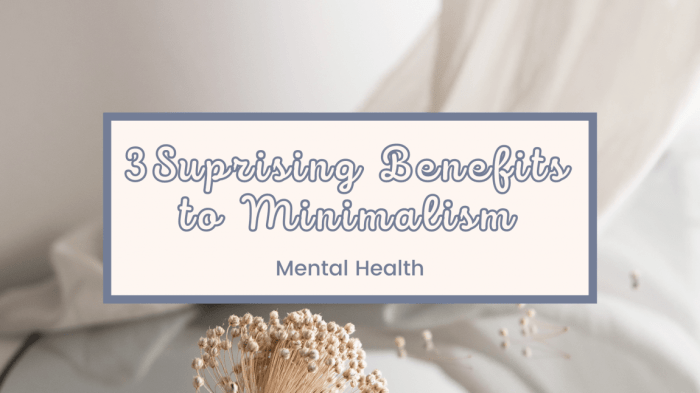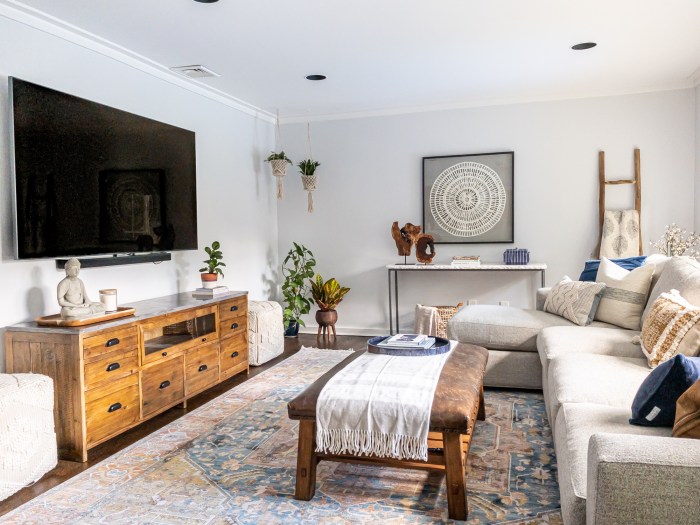The Link Between Minimalism and Mental Health: A Holistic Approach
Exploring the intricate relationship between minimalism and mental health unveils a fascinating journey towards well-being. As we delve into the depths of how simplicity can impact our minds, we unravel a narrative that is both enlightening and transformative.
Delving deeper, we uncover the profound effects of minimalism on our emotional and psychological landscape, shedding light on a unique perspective that intertwines two seemingly distant concepts.
The Definition of Minimalism and Mental Health

Minimalism is a lifestyle that focuses on simplifying one's life by decluttering physical possessions, reducing distractions, and prioritizing what truly matters. It emphasizes intentional living and mindfulness.
Mental health refers to our emotional, psychological, and social well-being. It is crucial for our overall well-being and affects how we think, feel, and behave in our daily lives.
Minimalism and Mental Health Connection
Minimalism can have a positive impact on mental health by reducing stress, anxiety, and overwhelm. By decluttering our physical space and simplifying our lives, we can create a sense of calm and clarity that can improve our mental well-being.
Benefits of Minimalism on Mental Health
Embracing minimalism can have profound benefits on mental health by reducing stress and anxiety, promoting a sense of calm and clarity, and improving overall well-being.
Reducing Stress and Anxiety
Minimalism encourages individuals to simplify their lives by focusing on what truly matters, eliminating distractions, and letting go of unnecessary possessions. This intentional approach helps reduce feelings of overwhelm and stress, leading to a calmer and more peaceful mindset.
Impact of Decluttering on Mental Well-being
Decluttering physical spaces not only creates a tidy environment but also has a positive impact on mental well-being. By clearing out clutter, individuals can experience a sense of accomplishment, increased productivity, and a clearer mindset, ultimately reducing feelings of anxiety and promoting mental clarity.
Promoting a Sense of Calm and Clarity
Minimalism promotes a minimalist lifestyle that focuses on simplicity, mindfulness, and intentionality. By eliminating excess and unnecessary distractions, individuals can experience a sense of calm, increased focus, and mental clarity. This minimalist approach allows for more space to prioritize self-care, mindfulness practices, and activities that nurture mental well-being.
Minimalism and Emotional Well-being
Emotional well-being plays a crucial role in our overall mental health. Minimalism, with its focus on simplicity and decluttering, can significantly impact our emotional stability and mindset.
The Power of Simplicity
Living a minimalist lifestyle can help reduce stress and anxiety by eliminating unnecessary distractions and excess possessions that can overwhelm us.
Enhanced Clarity and Focus
By decluttering our physical space and simplifying our lives, minimalism allows us to clear our minds and focus on what truly matters, leading to improved emotional well-being.
Cultivating Gratitude and Contentment
Minimalism encourages us to appreciate the present moment, practice gratitude for what we have, and find contentment in simplicity, which can foster a positive mindset and emotional stability.
Minimalism as a Tool for Self-care
Minimalism goes beyond just decluttering physical spaces; it can also serve as a powerful tool for self-care. By simplifying our surroundings and lifestyle, we can create a more peaceful and nurturing environment for ourselves.
Simplifying Environment for Improved Self-care Practices
- Reducing clutter in our living spaces can help reduce stress and anxiety levels.
- Having a minimalist wardrobe can save time and energy in choosing outfits, reducing decision fatigue.
- Clearing digital clutter, such as unsubscribing from unnecessary emails or organizing digital files, can improve focus and productivity.
Promoting Self-reflection and Mindfulness
- Minimalism encourages us to evaluate our possessions and prioritize what truly adds value to our lives, fostering self-reflection.
- By focusing on essential items and experiences, we learn to be more mindful of our consumption habits and appreciate what we have.
- Creating intentional spaces in our homes for relaxation or meditation can promote mindfulness and mental well-being.
Minimalism, Productivity, and Mental Clarity
Minimalism, with its focus on simplicity and decluttering, can have a significant impact on productivity and mental clarity. By removing distractions and unnecessary items from our physical and mental space, we can create a more conducive environment for concentration and focus.
Increased Productivity
Embracing a minimalist lifestyle can lead to increased productivity by reducing decision fatigue and enhancing focus. When our surroundings are uncluttered, our minds are better able to concentrate on the task at hand without being overwhelmed by distractions. This can result in more efficient work processes and better time management.
Mental Clarity
Minimalism promotes mental clarity by reducing stress and anxiety associated with a cluttered environment. A minimalist approach allows us to prioritize what truly matters to us, leading to a clearer mind and improved mental well-being. By simplifying our surroundings, we can experience a sense of calm and peace that enhances our overall cognitive function.
Tips for Staying Focused and Organized
1. Declutter your workspace regularly to remove any unnecessary items that may cause distractions. 2. Create a minimalist daily schedule with clear priorities and goals to stay focused on what truly matters. 3.
Practice mindfulness and meditation to enhance mental clarity and reduce stress. 4. Limit your digital distractions by organizing your digital space and setting boundaries for screen time. 5. Embrace a minimalist mindset in all areas of your life to maintain a clear and focused outlook.
Challenges of Incorporating Minimalism for Mental Health
Embracing minimalism for mental health benefits can be a transformative journey, but it is not without its challenges. Here are some common obstacles faced when adopting a minimalist lifestyle for improved mental well-being and strategies to overcome them:
Overcoming Material Attachment
One of the primary challenges of minimalism is letting go of material possessions that we have grown attached to. To overcome this obstacle, it is essential to shift our focus from the things we own to the experiences and relationships that truly bring us joy and fulfillment.
By practicing gratitude and mindfulness, we can gradually reduce our attachment to material possessions and prioritize mental well-being over material accumulation.
Dealing with Societal Expectations
Society often equates success and happiness with material wealth and possessions, making it challenging to embrace minimalism without feeling judged or misunderstood. To navigate societal expectations, it is crucial to remember that our worth is not defined by what we own but by who we are as individuals.
Setting boundaries and staying true to our values can help us overcome external pressures and focus on what truly matters for our mental health.
Finding a Balance
Striking a balance between minimalism and mental health needs is another significant challenge. While minimalism encourages simplicity and decluttering, it is essential to ensure that we are not depriving ourselves of essential resources or neglecting our emotional well-being in the process.
By setting realistic goals, practicing self-care, and seeking support from loved ones, we can find a sustainable balance that promotes both minimalism and mental well-being.
Final Thoughts
In conclusion, the fusion of minimalism and mental health presents a compelling narrative of balance and mindfulness. By embracing the essence of simplicity, we pave the way for a harmonious coexistence between our external environment and internal well-being.
Question Bank
How can minimalism impact mental health positively?
Minimalism can reduce overwhelm and promote a sense of clarity by eliminating distractions and fostering a more intentional living space.
Is minimalism suitable for everyone, regardless of their lifestyle?
Minimalism can be customized to suit individual needs and preferences, making it adaptable for people from various walks of life.
Can minimalism help in managing anxiety and stress effectively?
By simplifying our surroundings and focusing on essentials, minimalism can significantly reduce anxiety and stress levels, promoting mental well-being.



